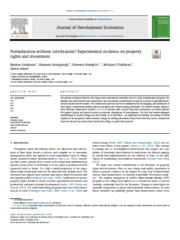
We present evidence from the first large-scale randomized-controlled trial of a land formalization program. We examine the link between land demarcation and investment in rural Benin in light of a model of agricultural production under insecure tenure. The demarcation process involved communities in the mapping and attribution of land rights; cornerstones marked parcel boundaries and offered lasting landmarks. The tenure security improvement through demarcation induces a 23 to 43 percent shift toward long-term investment on treated parcels.
We explore gender and parcel location as relevant dimensions of heterogeneity. We find that female-managed landholdings in treated villages are more likely to be left fallow—an important soil fertility investment. Women respond to an exogenous tenure security change by shifting investment away from relatively secure, demarcated land and toward less secure land outside the village to guard those parcels.
